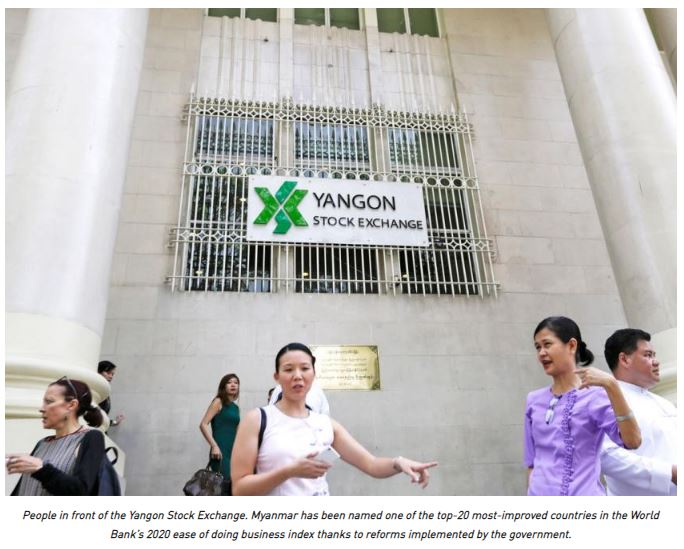Reforms behind Myanmar’sclimb up the ease of doing business index
In an endorsement of ongoing efforts to reform the economy, Myanmar has been named one of the top-20 most-improved countries in the World Bank’s 2020 ease of doing business index.
The index – part of the “Doing Business 2020” report – lists the economies that have recorded the greatest improvement in their ease of doing business score. The bank identified five recently implemented initiatives that have strengthened the business environment.
In terms of regulatory and legal measures, the reforms cited include the city of Yangon’s decision to impose stricter qualification requirements for architects and engineers, along with a new companieslaw that strengthensminority investor protections and boosts transparency by mandating fuller disclosure of transactions.
To streamline bureaucratic processes, the government, via the Directorate of Investment and Company Administration,launched an online company registration platform, simultaneously digitising and merging several previously existing procedures.
The reforms helped Myanmar boost its ranking to 165th out of 190 countries in the 2020 ease of doing business index, upsix places from 171st in 2019.
At the launch of the “Doing Business 2020” report in Yangon in early November, VivekPathak, the International Finance Corporation’s director for East Asia and the Pacific, emphasised the positive role that both the insolvency and secure transactions law will have on the financial services sector, specifically by mitigating against the negative consequences of poor non-performing loan ratios in the banking sector.
The improved ranking comes amid concerted government efforts to reform the economy, ongoingsince 2011, encouraging liberalisation and greater private sector activity.
A number of sectors have undergone reforms that have expanded access to foreign companies.These include the decision in November last year to allow foreign banks already operating in Myanmar to offer credit to domestic companies in both local and foreign currencies.
The decision, which is expected to improve access to credit in the economy, overturned previous rules that restricted overseas banks to offering foreign currency loans to foreign firms.
Elsewhere in the financial services sector, in January the Ministry of Planning and Finance announced that foreign companies would be allowed to sell life and non-life insurance products throughoutthe countryif they are granted a licence by the ministry or form joint ventures with local providers.This move wasdesigned to boost the level of insurance penetration in Myanmar, whichis the lowest in the region at 0.1 percent of GDP.
The reforms build on similar measures implemented in May last year, allowing 100pc foreign ownership in the retail and wholesale sector. Meanwhile, to help bring in foreign capital, in November last year the country set up the Ministry of Investment and Foreign Economic Relations, tasked specifically with attracting fresh investment flows.
Although significant progress has been made in improving the business environment in recent years, Myanmar still has plenty of room to further boost confidence in the economy. Indeed, the momentum of liberalisation has put certain strain on execution processes.
Being named among the top-20 most-improved economies meant Myanmar improved its score in at least three out of the 10 categories measured by the World Bank. Globally speaking, however, Myanmar still ranks poorly in the areas of enforcing contracts (187th out of 190), getting credit (181st), protecting minority investors (176th), trading across borders (168th) and resolving insolvency (164th).
The insufficient protection afforded to minority investors is particularly problematic in light of the recently passed Companies Law, which allows up to 35pc equity investment in domestic firms while still considering them local entities.
Some in the business community have cited the slow rate of financial liberalisation as a factor restricting capital to companies, which in turn has restrained overall economic potential. Conflict in Rakhine State has also had an impact on the country’s international reputation, coinciding with a reduction in foreign direct investment (FDI).
From FY 2011-12 to FY 2015-16, FDI increased from US$1.9 billionn to US$9.4 billion for a compound annual growth rate of 49.1pc. However, following the outbreak of violence in the western region, inflows fell to US$6.6 billion and US$5.7 billion in FY 2016-17 and FY 2017-18, respectively.
The country’s GDP growth has followed a similar pattern. After high growth was recorded in 2013 (7.9pc), 2014 (8.2pc) and 2015 (7.5pc), expansion eased to 5.2pc in 2016 before recovering to 6.3pc in 2017 and 6.8pc last year.
Source: https://www.mmtimes.com/news/reforms-behind-myanmarsclimb-ease-doing-business-index.html


 English
English




